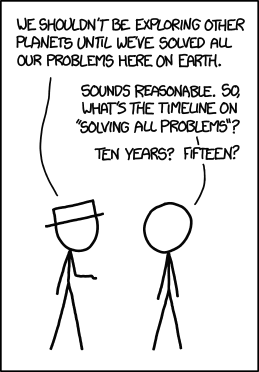This is my second post in a series dedicated to humanity's exploration of space via robotic and manned missions.
I came across this xkcd comic today: http://xkcd.com/1232/ . It struck a chord. How often do we hear from space exploration opponents that no money should be spent on space until we solve our problems on Earth?
As the comic points out, this criteria is completely unrealistic. For one, do we EVER expect to solve all of the problems on Earth? Secondly, even people individually don't operate well this way, focusing on only one set of problems without at least acknowledging and taking note of other possibilities. A well rounded person will explore multiple disciplines for the sake of gaining insight that could help them grow even in completely unrelated endeavours. The skills we gain almost always have some (whether secondary or tertiary) benefits to multiple environments.
Similarly, humanity's ability to cope with problems on Earth is enhanced when we step out of the Earth's pull (topical and gravitational) and apply ourselves to the worlds beyond. Our technology develops in surprising ways, our understanding of human beings, of our biology, of the Earth systems develops further and is strengthened or calls for revisions. Even something as simple as looking back and taking a photograph of our beautiful blue planet has a profound effect on how we view each other. (Stewart Brand gives this achievement very special significance in "Whole Earth Discipline").
I am likely preaching to the choir here, but I hope that one day, in not so distant future, our database of space missions in Starry Night doubles or triples as governments and private and public companies push themselves further and further to launch novel missions that will explore every corner of the Solar System and beyond. Who knows, perhaps even as individuals we'll be able to launch our own micro-missions. It wasn't that long ago when a project like http://pocketspacecraft.com/ would've seemed utterly unattainable.
